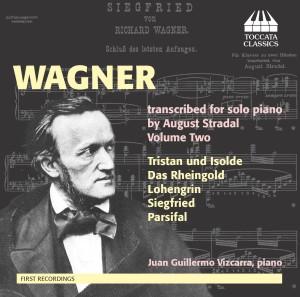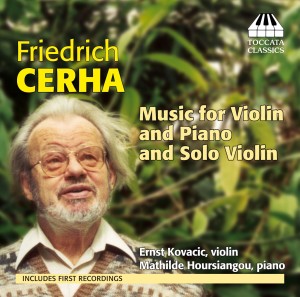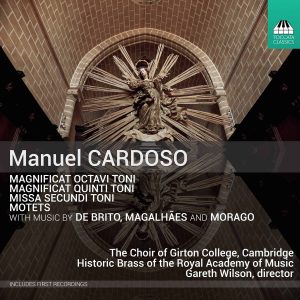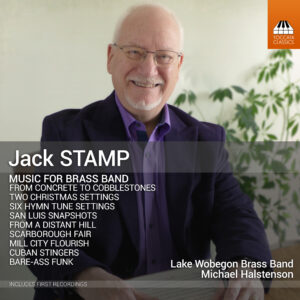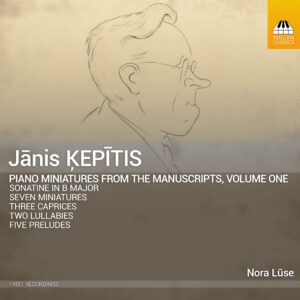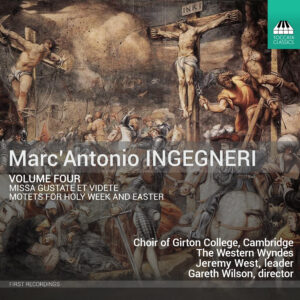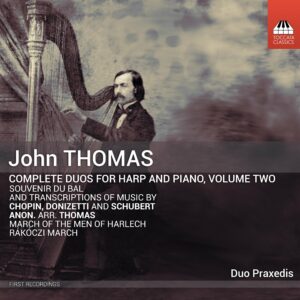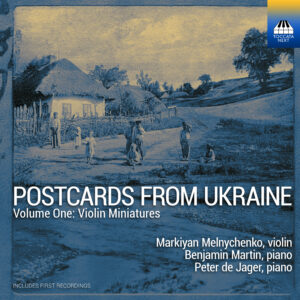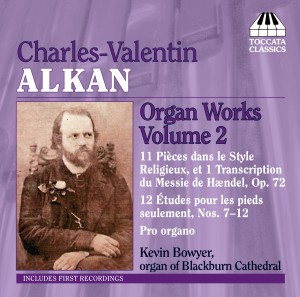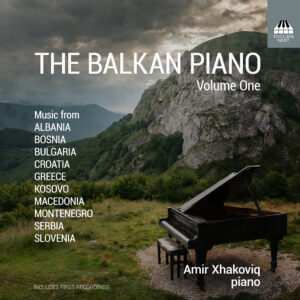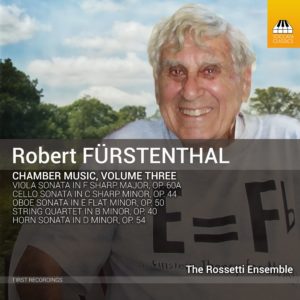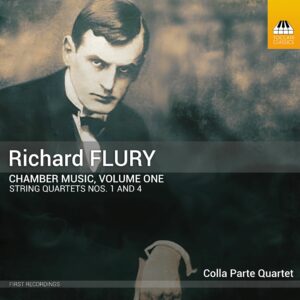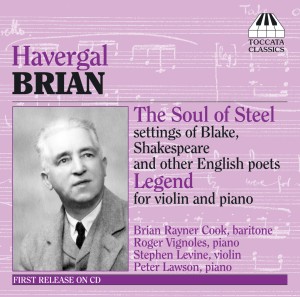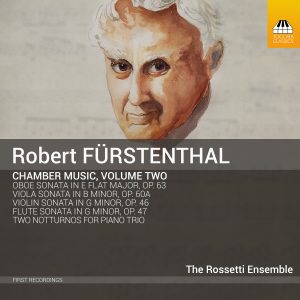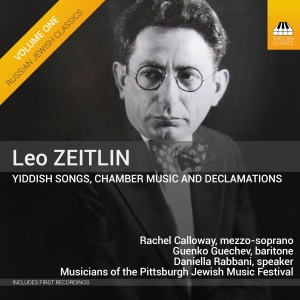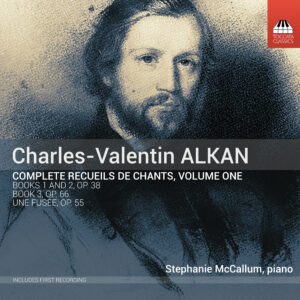Search Results for "Space Wolf: The First Omnibus mp3 torrent" – Page 10
Wagner: Transcriptions for solo piano by August Stradal, Volume Two
The Czech-born pianist and writer August Stradal (1860-1930) — a student of Bruckner and disciple of Liszt — was one of the more prolific transcribers of the nineteenth and earlier twentieth centuries, producing a vast quantity of piano music, including Liszt's orchestral works, most of the Bruckner symphonies, a good deal of the Baroque (not least a huge amount of Bach) and much more, most of it phenomenally difficult to play. This series of recordings presents his Wagner transcriptions, cast in the best barnstorming virtuoso tradition.
Juan Guillermo Vizcarra, piano
Friedrich Cerha: Music for Violin and Piano and Solo Violin
Friedrich Cerha, born in Vienna in 1926, is the doyen of Austrian composers, with a huge catalogue of music to his name. Cerha also trained as a violinist and most of the works in this anthology of his violin pieces were written for himself to play in the 1940s and '50s, when he was still active as a performer. It begins with his first surviving composition, the Hindemith-like First Violin Sonata of 1947; Stravinsky was another early influence before Cerha found the voice that made him Austria's leading avant-garde composer. Two later works, from almost half a century on, complete the stylistic trajectory.
Ernst Kovacic, violin
Mathilde Hoursiangou, piano
Manuel Cardoso: Missa Secundi Toni and Other Works
Manuel Cardoso (1566–1650) was one of the most important composers of the golden age of Portuguese polyphony around the turn of the seventeenth century. But modern choirs have been surprisingly slow to explore the rich legacy of his compositions: this is the first recording of his Missa Secundi Toni, and the first of any of his works with brass consort, its dark colours providing an effective contrast with the young voices of the Girton College Choir.
The Choir of Girton College, Cambridge (Tracks 1–2, 4–7)
Historic Brass of the Royal Academy of Music (Jeremy West, leader) (Tracks 1–5, 7 10–14, 16–17)
Lucy Morrell, organ (Tracks 1–5, 7–8, 10–13, 15–17)
Gareth Wilson, director (Tracks 1–7, 9–14, 16–17)
Jack Stamp: Music for Brass Band
Born in Maryland in 1954, John Stamp – universally known as ‘Jack’ – is a well-known figure, both as conductor and composer, in the symphonic wind-band movement that flourishes in US universities. But the sound of the brass band familiar in the UK has long been an enthusiasm, and his involvement with brass bands on both sides of the Atlantic – particularly the Minneapolis-based Lake Wobegon Brass Band, which takes its name from Garrison Keillor’s fictional Minnesota town – has generated a number of works which bring elements of the British brass tradition to audiences in the US Mid-West, imbuing them with a catchy rhythmic swing.
Steve Ecklund, horn
Bill Chouinard, organ
Lake Wobegon Brass Band
Michael Halstenson, conductor
Jānis Ķepītis: Complete Music for Solo Piano, Volume One
The Latvian composer Jānis Ķepītis (1908–89) has a fairly low profile even in his home country, never mind beyond its borders. His output was nonetheless substantial, with no fewer than six symphonies to his name, ten concertos, a number of large-scale choral-orchestral pieces, countless songs and choruses and a voluminous body of chamber music – almost all of it unknown. Ķepītis was himself a gifted pianist, and his hundred or so compositions for piano show a predilection for the miniature. The works here, discovered among his manuscripts, inhabit a world downstream from Skryabin and Rachmaninov, with a gentle hint of Debussy and an occasional wisp of Latvian folk-music.
Nora Lūse, piano
Marc’Antonio Ingegneri: Volume Four – Missa Gustate et videte; Motets for Holy Week and Easter
The Cremonese composer Marc’Antonio Ingegneri (c. 1535/36–92) is chiefly remembered as the teacher of Claudio Monteverdi while, for well-nigh 500 years, his own achievements were left to sit in the shadows. This fourth in a series of pioneering recordings from the Choir of Girton College, Cambridge, presents a sequence of music for Holy Week and Easter, confirming Ingegneri to have been one of the masters of his age. The striking range of moods heard here will confound conventional expectations of Renaissance polyphony: Ingegneri’s emotional palette extends from tender intimacy in some of these motets to dancing, celebratory jubilation in the Mass setting – all of it music of breathtaking richness and beauty.
Choir of Girton College, Cambridge
The Western Wyndes
Jeremy West, leader
Gareth Wilson, director
John Thomas: Complete Duos for Harp and Piano, Volume Two
Harpist to Queen Victoria, the Welsh composer John Thomas (1826–1913) wrote prolifically for his own instrument, both for solo harp and for duos of two harps or harp and piano – a combination where the different sounds of the two instruments enhance the clarity of the texture. Thomas’ own compositions use the elegant Romantic style of his own day, but he also left a generous legacy of transcriptions, with no fewer than fourteen Schubert songs recorded on this second volume of his complete duos for harp and piano. Although some of his music was intended for the Victorian drawing room, other pieces require a virtuoso technique – and all of it has a thoroughly engaging melodic appeal.
Duo Praxedis
Praxedis Hug-Rütti, harp
Praxedis Geneviève Hug, piano
Postcards from Ukraine, Vol. 1: Violin Miniatures
Ukrainian classical music is not even two centuries old, and for most of that time has had to contend with active attempts at suppression by a bullying neighbour. But Ukrainian composers have stood their ground, not least by taking inspiration from the folk-music that has long thrived in Ukraine’s mountains and fields. In this first of a series of Postcards from Ukraine the Ukrainian-Australian violinist Markiyan Melnychenko presents a programme of largely unknown miniatures for violin and piano, all based on, or inspired by, that folk-culture. Alternately sparkling and soulful, these violin showpieces make the case for a more thorough examination of the riches still to be discovered in Ukraine’s musical heritage.
Markiyan Melnychenko, violin
Benjamin Martin, piano
Peter de Lager, piano
Charles-Valentin Alkan: Organ Works, Volume Two
In the last three decades the staggeringly original piano music of Charles-Valentin Alkan (1813-88) has emerged from the darkness that surrounded it over the previous century and today features regularly in recital programmes. But Alkan’s music for organ – much of it initially conceived for the now obsolete pedal-piano – is no less powerful and imaginative, although little of it had been recorded before Kevin Bowyer began this survey. His first recording of this repertoire drew ecstatic reviews from the critics; this second instalment (of three) offers music and playing of equal quality.
Kevin Bowyer, organ
The Balkan Piano, Volume One
The composing traditions of the ten Balkan countries are as good as unknown in the rest of the world. In this revelatory piano recital, the Albanian pianist Amir Xhakoviq presents a glittering array of keyboard jewels from his own country and its neighbours, ranging from wild and energetic toccatas to timeless evocations of bells and other ancient traditions, with a surprisingly wide range of references, from folk-music to Scarlatti and jazz. As ‘Volume One’ indicates, this album is intended as the first of a series that will continue to explore the unfamiliar music of the Balkans.
Amir Xhakoviq, piano
Robert Fürstenthal: Chamber Music, Volume Three
When Germany invaded Austria in 1938, Robert Fürstenthal, born in 1920, took the path of many Viennese Jews and fled to the United States, where he made his living as an accountant; the fact that he had written music in his youth was soon forgotten. Reconnection, after 35 years, with the woman who had been his first love rekindled both that flame and his urge to compose, and from then on songs and chamber music flowed from his pen, preserving the spirit of fin-de-siècle Vienna under the Californian sun – ‘When I compose, I am back in Vienna’, he explained. He died in November 2016, aged 96, knowing that his lyrical, eloquent music was at last attracting the attention of both musicians and microphones.
The Rossetti Ensemble
Nicholas Korth, horn (1–4)
Timothy Lowe, cello (5–8)
Malcolm Messiter, oboe (9–12)
Martyn Jackson, violin (15–18)
Sara Trickey, violin (15–18)
Sarah-Jane Bradley, viola (13–18)
John Lenehan, piano (1–14)
Richard Flury: Chamber Music, Volume One
The exploration of the music of the Swiss composer Richard Flury (1896–1967) on Toccata Classics now turns to his chamber output, with this first recording of his String Quartets Nos. 1 and 4. Flury was himself a gifted violinist, and these works – written for personal pleasure and for musician friends – were composed with an intimate familiarity with the medium. In the fourteen years between these two quartets, Flury’s musical language consolidated, from the early foray into mild modernism heard in No. 1 into the rich, late-Romantic aesthetic of No. 4.
Colla Parte Quartet
Georg Jacobi and Susanna Holliger, violins
Friedemann Jähnig, viola
Eva Simmen, cello
Havergal Brian: Songs for baritone and piano, Legend for violin and piano
Havergal Brian (1876–1972) is renowned as the composer of 32 powerful symphonies (then the largest symphonic cycle since Haydn), 21 of them composed after his 80th birthday; his First Symphony, The Gothic, is reputed to be the largest ever composed. But in the first part of his career Brian was also active on a smaller scale, his songs attracting the advocacy of singers as prominent as John McCormack and John Coates. The range of emotion in these songs is nonetheless vast, from folky innocence via Shakespearean irony to deep tragedy. Brian Rayner Cook’s performances can be taken as authoritative: he studied the songs with the composer. The CD is completed by the Legend for violin and piano, Brian’s only surviving piece of chamber music.
Brian Rayner Cook, baritone
Roger Vignoles, piano
Stephen Levine, violin
Peter Lawson, piano
Robert FÜRSTENTHAL: Chamber Music, Volume Two
When Germany invaded Austria in 1938, Robert Fürstenthal, born in 1920, took the path of many Viennese Jews and fled to the United States, where he made his living as an accountant; the fact that he had written music in his youth was soon forgotten. Reconnection, after 35 years, with the woman who had been his first love rekindled both that flame and his urge to compose, and from then on songs and chamber music flowed from his pen, preserving the spirit of fin de siècle Vienna under the Californian sun – ‘When I compose, I am back in Vienna’, he explained. He died in November 2016, aged 96, knowing that his lyrical, eloquent music was at last attracting the attention of both musicians and microphones.
The Rossetti Ensemble
Kathryn Thomas, flute
Sarah-Jane Bradley, viola
Malcolm Messiter, oboe
Timothy Lowe, cello
John Lenehan, piano
Sara Trickey, violin
FIRST RECORDINGS
Leo Zeitlin: Yiddish Songs, Chamber Music and Declamations
A member of the Society for Jewish Folk Music in St Petersburg, Leo Zeitlin (1884–1930) was known mainly for Eli Zion, a classic of Jewish art-music. Zeitlin died only seven years after emigrating to New York, still a young man, and his reputation languished until the recent discovery of a trunk full of scores brought his music back to light. This album attempts to remedy decades of neglect, especially for his charismatic Yiddish song-settings for voice, strings and piano. Zeitlin’s powerful declamations – Romantic piano music underscoring spoken Yiddish and Russian poetry – points to a genre that once was popular and is now forgotten.
Musicians of the Pittsburgh Jewish Music Festival: Rachel Calloway, mezzo soprano; Guenko Guechev, baritone and speaker; Daniella Rabbani, speaker; Elisabeth Pridonoff, piano; Luz Manriquez, piano; Dennis O’Boyle, violin; Laura Motchalov, violin; Marylene Gingras-Roy, viola; Isaias Zelkowicz, viola; Aron Zelkowicz, cello
Charles-Valentin Alkan: Complete Recueils de Chants, Volume One
The wild originality of Charles-Valentin Alkan was little appreciated during his lifetime (1813-88), nor during the century which followed, when he was largely lost from sight. But now Alkan is increasingly recognised as one of the most individual personalities in all music. The five albums he called Recueils de chants — miniature tone-poems which marry Classical constraint to virtuoso Romantic excess — provide an attractive gateway to his freewheeling imagination.
Stephanie McCallum, piano
Stay In the Know
JOIN THE TOCCATA NEWSLETTER
"*" indicates required fields
By visiting our site, you agree to our privacy policy regarding cookies, tracking statistics, etc.
